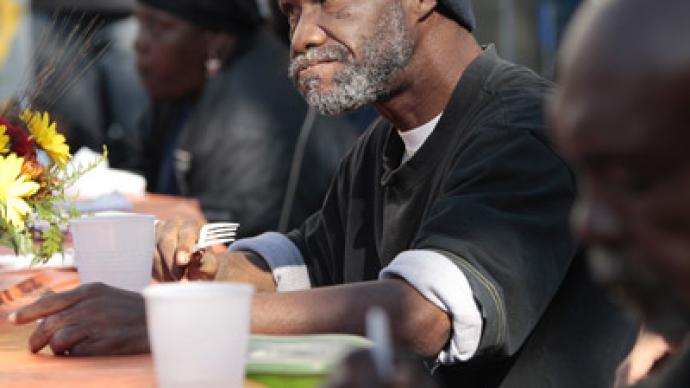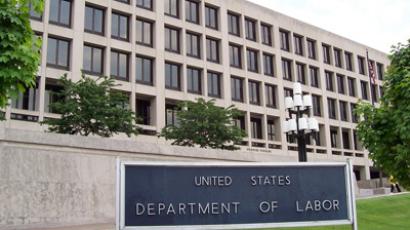Hunger and homelessness rise in the US

Homelessness and poverty is on the rise, with 84 percent of US cities reporting that requests for emergency food assistance increased in 2012. Of those seeking emergency food, 51 percent were families and 37 were employed.
The news comes just a few days before millions of Americans get together for Christmas. With homelessness and poverty reaching record levels this year, many families may not be able to afford the feast they were able to prepare in the past.The Hunger and Homelessness Survey released by the US Conference of Mayors states that of 25 cities surveyed, 21 have seen an increase in homelessness this year and the remaining three said it remained at the same level. Cities of all sizes, regions and wealth levels were surveyed, including Boston, Dallas, Los Angeles, Chicago, and Salt Lake City.The report found that 46.2 million Americans, or 15 percent of the population, were living in poverty, and the number of homeless people on a single night in January 2012 was 633,782. The struggling US economy has caused many workers to move from full-time work to part-time, scraping by and living from paycheck to paycheck.“In the last year, we saw a brand-new 26,000 households [about 56,000 individuals] needing food who never did before,” Steveanna Wynn, executive director of the SHARE food program in Philadelphia, told the Philadelphia Inquirer.The increase in poverty and homelessness is “the worst it’s ever been,” she added. “These people never in their wildest dreams through they’d have to go to a food cupboard.”Of those who sought emergency food, more than half were providing for their families, 37 percent were employed but not making enough money, 17 percent were elderly, and 8.5 percent were homeless, the survey found.To add to the severity of the situation, states are not able to provide the resources that people are seeking. Of the people needing emergency food assistance, 19 percent did not receive it – even though budgets for emergency food purchases increased by 11 percent this year. With a demand greater than the supply and a looming ‘fiscal cliff’ threatening to cut the already-scarce number of benefits, poverty-stricken Americans may be facing a crisis.With 2012 creeping to an end, struggling families are concerned that the potential ‘fiscal cliff’ could worsen their situation, especially if government funds for safety net programs are reduced and emergency unemployment benefits come to an end. Mayor Terry Bellamy of Asheville, N.C. told the Salt Lake Tribune that she is worried there won’t be enough resources for a growing number of struggling Americans in the future.“Dealing with growing needs in the face of dwindling resources is nothing new for mayors, but we are especially concerned about what could happen to our emergency food and shelter programs next year, and in the years beyond, if Washington cannot find a responsible way around – not over – the fiscal cliff,” she said.Carey Morgan, executive director of the Greater Philadelphia Coalition Against Hunger, said she doubts conditions will improve for those in need of food or shelter.“Congress is considering cutting food stamps,” she said. “Things could all be culminating in a great disaster. It’s all kind of disgusting.”














